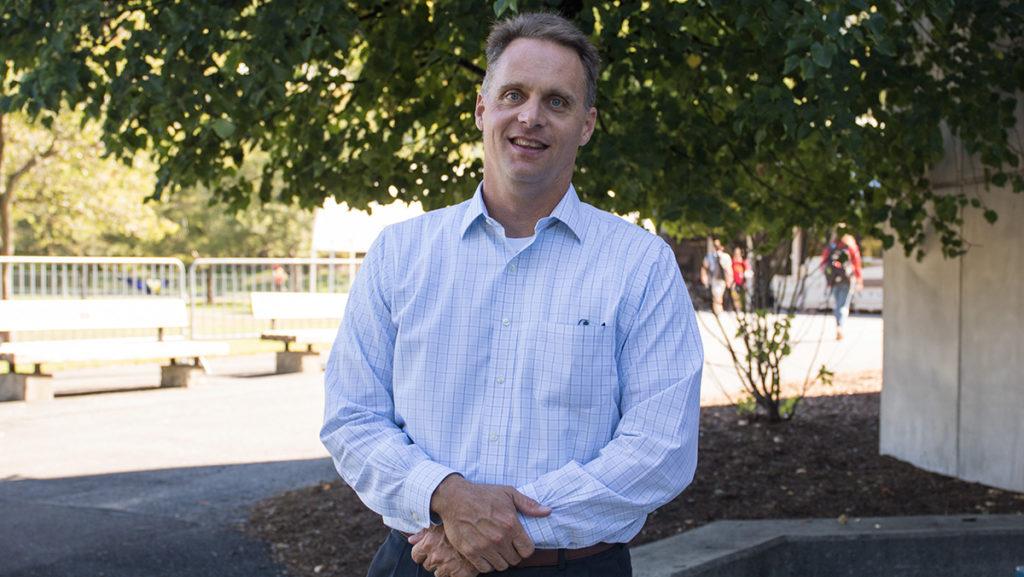Now in his first semester as director of energy management and sustainability at Ithaca College, Greg Lischke says he plans to increase student involvement in sustainability programs and that the college has some renewable energy projects in early stages.
Lischke was hired in May 2016 as the new director after his predecessor, Jerone Gagliano, resigned, serving roughly six months in the position. Previously, Lischke worked at The College at Brockport as the director of utilities and energy, and before that at Wake Forest University as the assistant director of utilities and engineering.
Staff Writer Sophie Johnson spoke with Lischke to discuss the state of sustainability at the college and his role in future sustainability initiatives.
Sophie Johnson: What are your long-term and short-term goals as the sustainability director of Ithaca College?
Greg Lischke: The long–term goal is to make a positive impact here at Ithaca College. There’s been a lot of organizational and personnel changes at the college, in facilities and in this role over the past number of years. So, I’m just trying to help get us to a good place. And then, looking forward, I’m trying to get some things put into place to help us move in a positive direction.
SJ: Last February, the college announced a power purchase agreement where it would purchase all of the energy produced at an off-campus solar array, covering 10 percent of its energy needs. How is the implementation of this project going? Can you give me any specific timeline?
GL: I visited the solar farm two weeks ago, and I think it’s safe to say we’re entering the final phases of legal review. We’re very tentatively hoping to have something more formal shortly, but my hope is this Fall, we’re hopefully able to officially start up the solar farm. It’s all but ready to go.
SJ: As of right now, the only sources of renewable energy purchased or utilized by the college are the off-campus solar array and the geothermal heating system for the Peggy Ryan Williams Center. Are there plans for other renewable energy projects either on or off campus in the works?
GL: There are — they’re in pretty early stages. I think we have some more opportunity for solar. I think wind, unfortunately, right now is not a very economically viable option, as far as feeding into a grid. But there might be some local, smaller use, opportunities with wind.
SJ: The Ithaca College Climate Action Plan has the goal of being carbon neutral by 2050. Are we on track with that?
GL: It’s too early for me to tell, it really is. … My current goal is to try to get our [Association of for the Advancement of Sustainability in Higher Education] submission completed before our November deadline … That’s going to help the college when we update our carbon numbers here probably in January or February. I will be able to answer that question better next year.
SJ: Could you just explain what exactly the AASHE is?
GL: It’s a sustainability tracking assessment rating system. It’s just a way for colleges to self-report how they are doing.
SJ: Ithaca College has not published a climate action progress report since 2013. When can we expect a new one, and what was the reason for the time gap?
GL: It’s on my radar for 2017, as is the sustainability master plan. I can’t speak for the history with 100 percent certainty … I just think the organizational changes, the turnover in this position, is one of the main reasons.
SJ: What is the importance of student involvement with sustainability initiatives on Ithaca’s campus? Do you have any specific plans with this?
GL: Student involvement is a huge part of it. One of the things I learned early on in my first month is that the Eco-Rep name, the Eco-Rep program wasn’t as robust last year as it had been in prior years. So, I worked with [junior] Josh Enderle — he’s my Eco-Rep program manager this year — and Josh and I have recently just hired 10 project coordinators, and our goal is to have those project coordinators focus on a particular theme. … Our hope is that the Eco-Rep project coordinators will find something that really speaks to them, that peaks their interest, that peaks their curiosity, that they have a passion for, and they will be able to partner with their fellow students, faculty and staff to help have events to help raise awareness. … I’m also working to kind of revamp or revitalize our internship program. I’ve got a [Resource and Environmental Management Program] intern working for credit this semester, and hopefully for monetary value, or for money next semester. … I’m also working on a few opportunities with some of my colleagues here at Ithaca College where external companies might have some support to bear towards a sustainability internship or something energy management internship, something along those lines.







